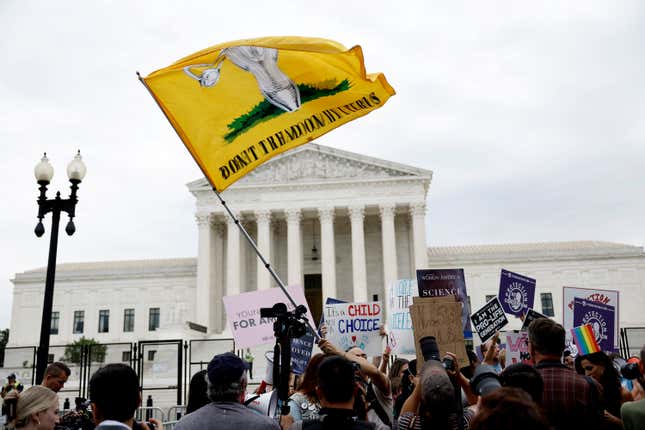
In an opinion decades of right-wing propaganda in the making, the Supreme Court has officially reversed Roe v. Wade, the 1973 court case establishing the constitutional right to an abortion.
The court split 6-3 in favor of reversing Roe. As expected, conservative Justice Samuel Alito wrote a scorching majority opinion, which officially ends the women’s guaranteed ability to obtain the procedure after 50 years.
The decision had been expected since May, when Politico published a leaked draft of Alito’s opinion decrying Roe as “egregiously wrong from the start.”
Thirteen states currently have trigger laws, which means that now that the justices have overturned Roe, abortion will become illegal almost immediately. Roughly twenty-six states are considered certain or likely to ban abortion now that the historic abortion ruling has been overturned, according to Guttmacher.
In many states expected to ban abortion, the procedure is already all but inaccessible, especially for lower-income Black pregnant people, who disproportionately seek abortion care, according to the Kaiser Family Foundation.
“The post Roe reality folks have been talking about is essentially the lived reality of southerners,” said Oriaku Njoku, co-founder of Access Reproductive Care Southeast. “We imagine it getting even more difficult and more costly to access care because folks are going to have to travel further in order to get appointments.”
In 2021, state lawmakers passed over 100 anti-abortion regulations (a record) predominantly throughout the south and Midwest, according to the Guttmacher Institute, a pro-choice research nonprofit group.
In less than a week’s time, Florida, once a safe haven for abortion because of their strong privacy laws, will enact a ban on abortion after 15 weeks of pregnancy. The ban is expected to nearly eliminate one of the few lifelines in the south for folks who will overnight see abortion outlawed completely in their states.
And in Louisiana, Democratic Governor John Bel Edwards signed a law expanding the state’s trigger law to exclude exceptions for “rape, incest, or the life of the the mother.” Now that Roe has fallen, this could mean doctors would face criminal penalties for saving a pregnant person’s life if it means terminating the pregnancy.
There’s no-doubt Jasmen Rogers with Floridians for Reproductive Freedom, told The Root, that these new bans will disproportionately hurt Black folks:
“When you see attacks like that, they will always disproportionately impact people at the margin, specifically Black people, Black women, trans people.”
Despite the fact that the battle for Roe has been lost on the federal level, Kwajelyn Jackson, Executive Director at Feminist Women’s Health Center, an Atlanta-based abortion clinic, says it’s not time to give-up.
“So many of the most devastating decisions are happening at the state and local level,” said Jackson. “And so I’m telling people to connect with your local clinic, connect with your local fund, pay attention to your local elections. Those are the places where we have the most potential for power.”

